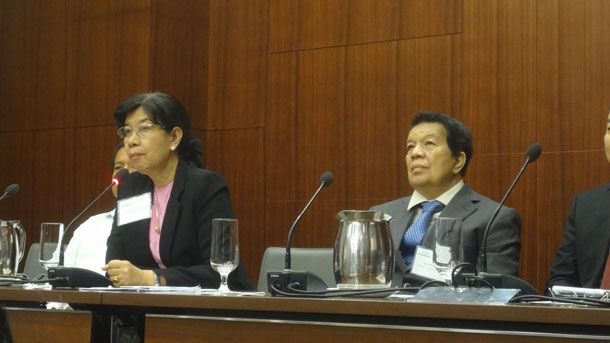WASHINGTON — A meeting of Burmese government officials, opposition party leaders and ethnic minority groups held in the US capital this week has resulted in agreement on an ambitious target for eliminating malaria in Burma by 2030, a top visiting health official said here Tuesday.
To achieve this target, the government estimates that it will need US$1.2 billion over the next 15 years or $80 million per annum, Burma’s deputy health minister, Dr. Thein Thein Htay, told The Irrawaddy at the conclusion of what she described as an historic meeting among a variety of stakeholders from both inside Burma and abroad.
“We have set a goal to have malaria-free Myanmar by 2030,” she told reporters at a news briefing attended by Dr. Tin Myo Win, senior health advisor to Burmese opposition leader Aung San Suu Kyi; Brig-Gen Tin Maung Hlaing, commandant of the Defense Services Medical Research Center; and Eh Kalu Shwe Oo, director of the Karen Department of Health and Welfare, among others.
The diverse array of stakeholders—and the deal they ultimately struck—reflected a rare moment of consensus in Burma’s fractious politics over an issue that health experts have warned could pose a major challenge in the years ahead if left unaddressed.
Representatives of ethnic Shan and Karenni health organizations also attended the meeting, which was facilitated by the University of Maryland School of Medicine and the Center for Strategic and International Studies (CSIS), a leading US think-tank.
Noting that Malaria imposes serious burdens on Burma’s economic growth and the health and wellbeing of all people of the country, a joint statement issued at the end of the meeting said these burdens may also pose risks regionally and globally. With a sustained and successful effort in Burma, it will be possible to eliminate malaria in Southeast Asia and reverse the spread of resistance, which is a global threat to malaria control, it said.
Health experts have warned in recent years that the spread of malarial strains resistant to artemisinin combination treatment (ACT) in Southeast Asia could set back efforts to fight the disease by decades.
ACT is the standard method of treatment globally for malaria, and scientists have yet to develop an alternative if resistance to it should become widespread.
Burma is at the front lines of the fight to stamp out drug-resistant malaria, given its location linking mainland Southeast Asia—where resistance first gained traction—and India, from which it could spread to Africa and beyond if it reaches the South Asian nation’s population of more than 1.2 billion people.
“It is a very ambitious target, but it is a necessity at the national level,” said Thein Thein Htay, the deputy health minister, adding that she hoped the international community would contribute to the cause.
Malaria cases have decreased from more than 300,000 in 2013 to about 250,000 in 2014, she said, noting that the country was moving from malaria control to a program of malaria elimination.
Dr. Bernard Nahlen, deputy coordinator of the President’s Malaria Initiative, established in 2005 by then US President George W. Bush, told The Irrawaddy that the US government would make a generous financial contribution toward Burma’s eradication effort, planning to put $9 million into the cause over the next fiscal year.
“We have given $30 million to Myanmar in the past few years,” he said.
A representative from the National League of Democracy (NLD), Burma’s largest opposition party, offered the party’s full support for the program, saying its aims were in the national interest.
“Whoever wins the coming election, this malaria elimination program will go on, because there will still be this disease threatening our country,” Dr. Tin Myo Win told reporters, referring to a historic general election in Burma due Nov. 8.
The agreement reached this week was hailed by the American Society of Tropical Medicine and Hygiene as historic.
“This is science diplomacy at its best,” said Christopher V. Plowe, president of the society and director of the Institute for Global Health at the University of Maryland School of Medicine.
“For Myanmar and for the world, this coming together is a model for how to use science and medicine not only to solve important health problems, but also as a way to foster broader social and political change,” he said.
“The discussions in Washington are even more promising given the history of adversity among those making the commitment to reach across deep political and ethnic boundaries to unify against a common foe: malaria,” Plowe said.
Brig-Gen Tin Maung Hlaing said Burma’s military would throw its full support behind the national campaign to eliminate malaria from the country. Having met Rear Adm. Colin Chinn, command surgeon of the US Pacific Command, Tin Maung Hlaing said he would be visiting a US military hospital on Wednesday. At a time when there is a nearly negligible military-to-military relationship between the two countries, such a visit is seen as being of importance in its own right.

















